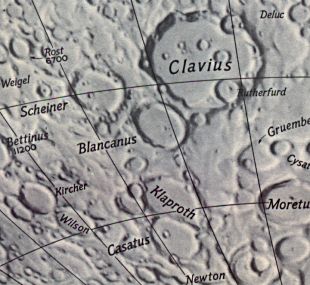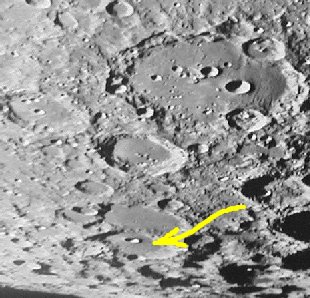

4/1/2004 1:50UT Wichita Falls, Texas USA 33.824 -98.544 994 ft. Temp 60 F. 3 mph wind SW. Seeing 8 of 10. Transparency 9 of 10. 8" f/6 Reflector at x94 and x203.
The 79.5% gibbous moon revealed a splendid Lunar sunrise ray in Casatus. The ray was seen stretching west from the middle of the crater just south of C to the north side of J at the south rim. It was a simple ray extending 35 to 40 Km. The southern wedge of the dark shadow appeared to be a spike from a raised surface at mid crater, but I believe was really the rising rim of craterlet J.
-David Ryle
The Initial Predictions, Using Data in Original Reporting
Site Longitude = +98.544
Site Latitude = +33.824
Reproducing Lighting For: 2004/4/1 at 01:50 U.T.
Desired Solar Altitude = +3.904(Rising), Azimuth = +80.253
Feature = CASATUS
Feature Longitude: = -30.500
Feature Latitude: = -72.600
Average Co-longitude = 43.661
Moon's Altitude Restricted = N
In the Time column, D=Daylight, T=Twilight
---- Moon's ---- -- Earth's --
Topocentric Topocentric -------- Sun's --------
UT Date Time Alt° Semi-Diam'' Long° Lat° Colong° Lat° Azim°
2004/04/01 01:50T +66.650 930.35 -5.614 -6.600 040.961 -0.829 +80.253
Crater Description:
Casatus, -152, -953: A majestic ring-plain 0 miles in diameter, with walls rising on the west to 18,000 feet, and on the east in a grand peak to the great height of 22,000 feet above the floor. Along the crest of the west wall is a crater chain; the wall here appears as a night line of white cliffs. At the foot of the inner south-east wall is a row of mountain masses, like huge boulders. On the inner south slope is a large crater, and on the northern portion of the floor is another, C, of considerable depth; in addition there are some craterlets and hills. (Wilkins and Moore, The Moon, Faber & Faber, 1955)

